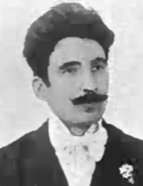

Vale de Açores, Mortágua, 1881 – Parede, Cascais, 1971
Lopes de Oliveira is author of an extensive work, not only historiographical but also biographical (such as Eça de Queiroz and Guerra Junqueiro. A sua vida e a sua obra), memorialistic (Rema Sempre! e ...E mesmo contra a maré!), and of social philosophy (Quadro da História Universal: Evolução da Humanidade). In terms of historiography, his writings focused mainly on the history of the Portuguese republican regime, having the political propaganda as centre of his analysis. He collaborated in the work História do Regímen Republicano em Portugal (1930-1935), by Luís de Montalvor, as author of the chapters dedicated to the republican propaganda, and, in 1947, published his História da República Portuguesa: a propaganda na Monarquia Constitucional. There, the historian traced the course of the democratic movement from its origins – which he considered to be the events of 1817, where there was “the first manifestation of the spirit of liberty” (História da República Portuguesa…, 1947, p. 7), and the Revolution of 1820 – to the establishment of the Republic on the 5th of October of 1910. While highlighting the moments that, in his point of view, were crucial in the consolidation of the republican project, such as the foundation of the Portuguese Republican Party, which he dated in 1876, and the political propaganda work carried out by its main political agents, Lopes de Oliveira sought to place the Portuguese situation in the European overview, often considering the international events that led to political changes in Portuguese territory. It is a work of historical dissemination, in which the historian’s republican vision is easily discernible, and in which concepts such as Democracy (sometimes written with capital, and sometimes in lower case) and Republic are central. As it is well known, Lopes de Oliveira considered that the establishment of democracy and the progress of the nation would only be possible in a republican regime. A few years before his death, he would still publish a História da República Francesa: suas causas, os Estados Gerais, a Assembleia Constituinte. Being also focused on the purpose of historical dissemination, it is an illustrated work (portraits, engravings, maps) and devoid of erudite apparatus, like footnotes and bibliography, even though the author often cites sources from that time and posterior works to the French Revolution, such as the work of Michelet.
